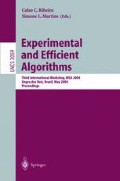Abstract
Computing a shortest path from one node to another in a directed graph is a very common task in practice. This problem is classically solved by Dijkstra’s algorithm. Many techniques are known to speed up this algorithm heuristically, while optimality of the solution can still be guaranteed. In most studies, such techniques are considered individually. The focus of our work is the combination of speed-up techniques for Dijkstra’s algorithm. We consider all possible combinations of four known techniques, namely goal-directed search, bi-directed search, multi-level approach, and shortest-path bounding boxes, and show how these can be implemented. In an extensive experimental study we compare the performance of different combinations and analyze how the techniques harmonize when applied jointly. Several real-world graphs from road maps and public transport and two types of generated random graphs are taken into account.
This work was partially supported by the Human Potential Programme of the European Union under contract no. HPRN-CT-1999-00104 (AMORE) and by the DFG under grant WA 654/12-1.
Access this chapter
Tax calculation will be finalised at checkout
Purchases are for personal use only
Preview
Unable to display preview. Download preview PDF.
References
Zhan, F.B., Noon, C.E.: A comparison between label-setting and label-correcting algorithms for computing one-to-one shortest paths. Journal of Geographic Information and Decision Analysis 4 (2000)
Barrett, C., Bisset, K., Jacob, R., Konjevod, G., Marathe, M.: Classical and contemporary shortest path problems in road networks: Implementation and experimental analysis of the TRANSIMS router. In: Möhring, R.H., Raman, R. (eds.) ESA 2002. LNCS, vol. 2461, pp. 126–138. Springer, Heidelberg (2002)
Nachtigall, K.: Time depending shortest-path problems with applications to railway networks. European Journal of Operational Research 83, 154–166 (1995)
Preuss, T., Syrbe, J.H.: An integrated traffic information system. In: Proc. 6th Int. Conf. Appl. Computer Networking in Architecture, Construction, Design, Civil Eng. and Urban Planning, europIA 1997 (1997)
Shekhar, S., Fetterer, A., Goyal, B.: Materialization trade-offs in hierarchical shortest path algorithms. In: Proc. Symp. on Large Spatial Databases, pp. 94–111 (1997)
Barrett, C., Jacob, R., Marathe, M.: Formal-language-constrained path problems. SIAM Journal on Computing 30, 809–837 (2000)
Dijkstra, E.W.: A note on two problems in connexion with graphs. Numerische Mathematik 1, 269–271 (1959)
Fredman, M.L., Tarjan, R.E.: Fibonacci heaps and their uses in improved network optimization algorithms. Journal of the ACM 34, 596–615 (1987)
Cherkassky, B.V., Goldberg, A.V., Radzik, T.: Shortest paths algorithms: Theory and experimental evaluation. Mathematical Programming 73, 129–174 (1996)
Zwick, U.: Exact and approximate distances in graphs - a survey. In: Meyer auf der Heide, F. (ed.) ESA 2001. LNCS, vol. 2161, pp. 33–48. Springer, Heidelberg (2001)
Goldberg, A.V.: A simple shortest path algorithm with linear average time. In: Meyer auf der Heide, F. (ed.) ESA 2001. LNCS, vol. 2161, pp. 230–241. Springer, Heidelberg (2001)
Meyer, U.: Single-source shortest-paths on arbitrary directed graphs in linear average-case time. In: Proc. 12th Symp. on Discrete Algorithms, pp. 797–806 (2001)
Pettie, S., Ramachandran, V., Sridhar, S.: Experimental evaluation of a new shortest path algorithm. In: Mount, D.M., Stein, C. (eds.) ALENEX 2002. LNCS, vol. 2409, pp. 126–142. Springer, Heidelberg (2002)
Hart, P., Nilsson, N.J., Raphael, B.A.: A formal basis for the heuristic determination of minimum cost paths. IEEE Trans. Sys. Sci. Cybernet. 2 (1968)
Shekhar, S., Kohli, A., Coyle, M.: Path computation algorithms for advanced traveler information system (ATIS). In: Proc. 9th IEEE Int. Conf. Data Eng., pp. 31–39 (1993)
Schulz, F., Wagner, D., Weihe, K.: Dijkstra’s algorithm on-line: An empirical case study from public railroad transport. ACM Journal of Exp. Algorithmics 5 (2000)
Ahuja, R., Magnanti, T., Orlin, J.: Network Flows. Prentice-Hall, Englewood Cliffs (1993)
Pohl, I.: Bi-directional and heuristic search in path problems. Technical Report 104, Stanford Linear Accelerator Center, Stanford, California (1969)
Kaindl, H., Kainz, G.: Bidirectional heuristic search reconsidered. Journal of Artificial Intelligence Research 7, 283–317 (1997)
Holzer, M.: Hierarchical speed-up techniques for shortest-path algorithms. Technical report, Dept. of Informatics, University of Konstanz, Germany (2003), http://www.ub.uni-konstanz.de/kops/volltexte/2003/1038/
Schulz, F., Wagner, D., Zaroliagis, C.: Using multi-level graphs for timetable information in railway systems. In: Mount, D.M., Stein, C. (eds.) ALENEX 2002. LNCS, vol. 2409, pp. 43–59. Springer, Heidelberg (2002)
Jung, S., Pramanik, S.: An efficient path computation model for hierarchically structured topographical road maps. IEEE Transactions on Knowledge and Data Engineering 14, 1029–1046 (2002)
Wagner, D., Willhalm, T.: Geometric speed-up techniques for finding shortest paths in large sparse graphs. In: Di Battista, G., Zwick, U. (eds.) ESA 2003. LNCS, vol. 2832, pp. 776–787. Springer, Heidelberg (2003)
Näher, S., Mehlhorn, K.: The LEDA Platform of Combinatorial and Geometric Computing. Cambridge University Press, Cambridge (1999), http://www.algorithmicsolutions.com
Waxman, B.M.: Routing of multipoint connections. IEEE Journal on Selected Areas in Communications 6 (1988)
Dial, R.: Algorithm 360: Shortest path forest with topological ordering. Communications of ACM 12, 632–633 (1969)
Goldberg, A.V.: Shortest path algorithms: Engineering aspects. In: Eades, P., Takaoka, T. (eds.) ISAAC 2001. LNCS, vol. 2223, pp. 502–513. Springer, Heidelberg (2001)
Author information
Authors and Affiliations
Editor information
Editors and Affiliations
Rights and permissions
Copyright information
© 2004 Springer-Verlag Berlin Heidelberg
About this paper
Cite this paper
Holzer, M., Schulz, F., Willhalm, T. (2004). Combining Speed-Up Techniques for Shortest-Path Computations. In: Ribeiro, C.C., Martins, S.L. (eds) Experimental and Efficient Algorithms. WEA 2004. Lecture Notes in Computer Science, vol 3059. Springer, Berlin, Heidelberg. https://doi.org/10.1007/978-3-540-24838-5_20
Download citation
DOI: https://doi.org/10.1007/978-3-540-24838-5_20
Publisher Name: Springer, Berlin, Heidelberg
Print ISBN: 978-3-540-22067-1
Online ISBN: 978-3-540-24838-5
eBook Packages: Springer Book Archive

